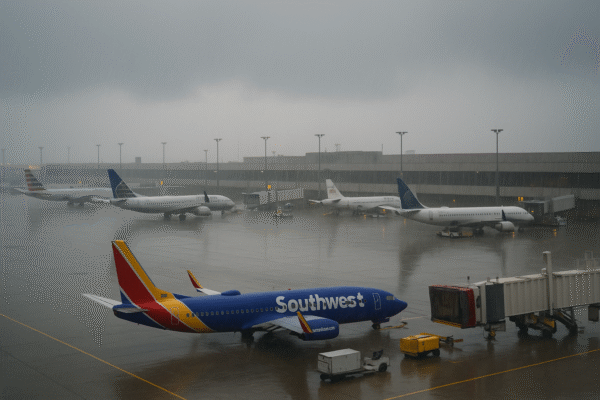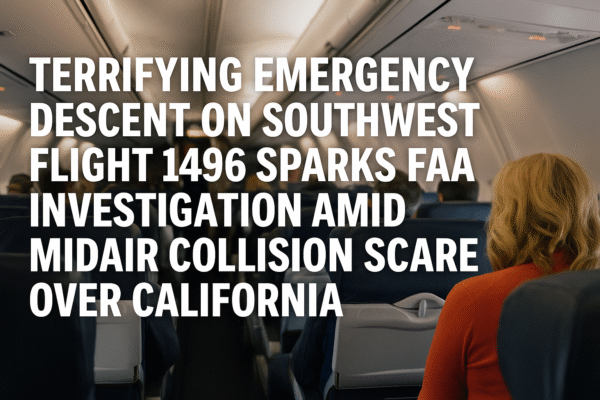Travelers across the United States faced major flight disruptions on Saturday as a powerful storm system swept through the Midwest and East Coast, triggering over 250 flight cancellations and hundreds more delays. Airlines including Southwest, Delta, United, American, JetBlue, and others were significantly impacted as thunderstorms, flash flooding, and strong winds disrupted operations at key travel hubs.
According to data from FlightAware, delays and cancellations began early in the day, with Chicago O’Hare International Airport (ORD) and Midway International Airport (MDW) suffering the worst disruptions. These delays quickly cascaded across the national airspace system as the storm moved eastward.
Chicago Airports Hit Hardest by Weather Disruptions
In Chicago, a major air traffic control and airline hub, both O’Hare and Midway experienced substantial delays. Southwest Airlines canceled 45 flights and delayed another 73, largely due to severe thunderstorms and wind gusts that exceeded 40 mph in parts of Illinois. United Airlines, headquartered in Chicago, also faced numerous delays and rescheduling challenges.
Flash flood alerts were issued by the National Weather Service, with accumulation rates exceeding one inch per hour in some areas, overwhelming airport drainage systems and forcing temporary ground stops.
New York City Airports See Dozens of Cancellations
John F. Kennedy International Airport (JFK) and LaGuardia Airport (LGA) in New York were also hit hard, as severe rain bands pushed into the Northeast. JFK reported 36 canceled flights, primarily from Delta Air Lines, JetBlue, and Lufthansa, while LaGuardia experienced 25 cancellations, affecting Delta and Republic Airways.
The Federal Aviation Administration (FAA) implemented temporary traffic management programs at these New York-area airports, further compounding delays for domestic and international travelers. High humidity and unpredictable wind shifts made takeoff and landing operations difficult throughout the afternoon.
DFW Airport Sees Ripple Effects Despite Fewer Cancellations
While Dallas-Fort Worth International Airport (DFW) saw only seven outright cancellations, most from American Airlines, the impact was felt in longer taxi times, rerouted flights, and cascading schedule delays. Localized thunderstorms and storm system remnants from the Midwest caused air traffic congestion in and out of Texas.
American Airlines, which maintains a major hub at DFW, deployed contingency plans, including flexible rebooking policies for affected passengers. Delays were also noted across smaller Texas airports such as Love Field (DAL) and Austin-Bergstrom (AUS) due to system-wide strain.
Widespread Disruptions as Storm System Moves East
As the storm progresses into the Mid-Atlantic and New England, further disruptions are likely. Meteorologists from NOAA and the National Weather Service forecast continued heavy rain, localized flash flooding, and wind gusts that could impact airports such as Philadelphia International (PHL), Boston Logan (BOS), and Newark Liberty International (EWR) into early next week.
Airlines like JetBlue, United, and Air Canada are already bracing for additional delays. A travel advisory issued by the FAA urged passengers to check flight statuses frequently and opt-in for real-time airline notifications.
Traveler Advisory and Rebooking Recommendations
With the peak summer travel season in full swing and many flights already operating at high capacity, airlines are offering flexible change policies. Passengers flying through affected airports are encouraged to:
- Check their airline’s mobile app or website before heading to the airport.
- Enroll in alerts for real-time updates on gate changes or cancellations.
- Explore alternate airports or routes where feasible.
- Rebook without fees, as most major airlines have activated weather waivers through the weekend.
Several airports, including Chicago O’Hare, LaGuardia, and JFK, have also advised travelers to allow for additional time and anticipate long lines at security and customer service counters.
Ongoing Risk of Travel Disruptions Nationwide
According to the U.S. Department of Transportation, weather is the leading cause of flight delays during summer months, accounting for nearly 30% of all disruptions. This latest storm system, stretching from the Great Lakes to the Eastern Seaboard, is expected to persist through Monday, prompting continued risk for airline delays and re-routing.
The National Oceanic and Atmospheric Administration (NOAA) forecasts another potential system forming over the southern plains by midweek, which could renew disruption concerns for airports in Atlanta (ATL), Charlotte (CLT), and Washington D.C. (DCA, IAD).
Conclusion
The widespread flight disruptions underscore the vulnerability of air travel to sudden weather shifts—particularly during the busy summer months. With more than 250 flights canceled and hundreds delayed in a single day, passengers are reminded to stay informed, flexible, and proactive in their travel planning as weather systems continue to evolve across the U.S.
For more travel news like this, keep reading Global Travel Wire


















